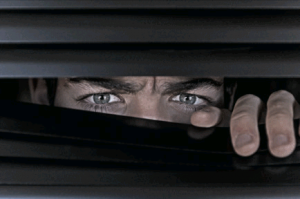By Jason Meadors
 I’m pretty sure you won’t find what I’m about to say in any Board policy or finding by NCRA’s Committee on Professional Ethics (COPE), in which I have the honor of serving this year. No, what follows are my own views of foundational bases of our ethics, in looking at the ethical frameworks in the Code and Advisory Opinions, and with a few decades of experience in this all-consuming career. I also have a regular ethics seminar that I present, and my views are woven into that as well, and I haven’t been seriously challenged. Yet.
I’m pretty sure you won’t find what I’m about to say in any Board policy or finding by NCRA’s Committee on Professional Ethics (COPE), in which I have the honor of serving this year. No, what follows are my own views of foundational bases of our ethics, in looking at the ethical frameworks in the Code and Advisory Opinions, and with a few decades of experience in this all-consuming career. I also have a regular ethics seminar that I present, and my views are woven into that as well, and I haven’t been seriously challenged. Yet.
“What are these views?” you might ask. Or you might not. I suspect the latter has the higher probability. But I’m going to tell you anyway. The ethical construct of our sacred court reporting profession has a foundation of three legs. Because Dave Wenhold, our preeminent lobbyist, has taught me that clever acronyms help people better identify and remember concepts, let’s call them the CIA.
Those three foundational legs of our profession are:
- Confidentiality
- Impartiality
- Accuracy
There you go. Our CIA.
Confidentiality
Our Code of Professional Ethics (In a slight bit of acronym confusion with the committee, also named COPE), Number 4, addresses this directly. “Preserve the confidentiality and ensure the security of information,” and so on.
This makes eminent good sense, does it not? When we work, we hear dreadful events, shameful secrets, and financial goings-on from hosts of people. If we want the process to have integrity when it comes to the record, if we want our clients and consumers to see us as trustworthy professionals, if we want our profession to continue, we have to ensure that information that we hear doesn’t go where it’s not supposed to go.
It’s so easy to get caught up conversation among ourselves, with our clients, with members of the general public, because sometimes we hear some pretty darned interesting things. May I suggest a little self-administered test when you’re talking with someone and you get the impulse to sneak out a detail from a case, ask yourself: If this person says, “Oh, the reporter told me,” how will that reflect on you?
(There’s actually a simpler practice that doesn’t require retrospection: Just shut up.)
They bring us, outsiders, in to the proceedings, secure in their belief that we will not be the conduit of information to the rest of the world. Let’s keep it that way.
But that’s not the only reason we are called to our professional tasks. There’s the second foundational leg of:
Impartiality
Five of the ten items in the NCRA Code of Professional Ethics encompass impartiality. Indeed, Number 1 of the Code starts with, “Be fair and impartial…”
And this concept really is the linchpin in working at our professional heights, and its existence flows directly to the reliability of the record that we’re preserving.
In the litigation arena, in one certain sense, our presence might seem a bit odd. The parties are presenting their own weighted view of evidence. The attorneys are advocates for their clients. The judge is protecting the public interest. Everyone has taken a side. And still they bring us in, with our mandate of being both disinterested and uninterested, because it’s the only way that the history that they read later has been kept and delivered without bias, without favoritism, without an eye to supporting one side or the other.
“I love a job where I’m actually paid to not be interested in anyone.”
That’s how it must be. Even while immersed in their advocacy, they are paying us to be emotionally distant and removed from the proceedings that we report. All sides have to be able to rely on the integrity of the transcript without a second thought about whether the reporter might be bringing other interests into the legal game.
Sure, there are times when that “not caring” thing gets pushed and emotions run high. We all have our stories. My memorable one, and not in a good way: Within a couple weeks after a family member’s death, I was taking a deposition about a case that involved a fatality, and the grief of the deponent was open and unyielding. Because of my father’s so-recent death, my own emotions were pretty raw at the time, and I struggled to keep my expression impassive. I’m not sure how well I fared.
But the transcript that resulted from that deposition did not, could not, be weighted toward the grieving deponent, toward my client, toward the attorney who represented the sobbing witness, or anyone else in the room. That’s what all parties expect and what they deserve when they hire us, the professionally detached historian in the room.
(At this point, the alert reader may say, “Hey! You just told us not to talk about our cases!” And that is why I kept it so nonspecific as to time, place, parties, and even the type of case.)
Sometimes at introductions in the deposition room, one attorney will tell the witness, “I represent the plaintiff.” The other one will say, “I represent the defendant.” When the deponent looks at me, I introduce myself and say, “I represent the paper that comes out of this.” The integrity of the record is, indeed, the focus of our own advocacy.
But our confidentiality and impartiality aren’t the only reasons we’re being hired, which brings us to:
Accuracy
This leg is the surprisingly more tenuous one to talk about, because nowhere in the Code of Professional Ethics does it actually state that the reporter has an ethical duty to provide an accurate record.
I’m going to pause a moment to let that sink in. Let me know when you’re ready.
Okay, ready?
The reliability of the record is a principle woven into the fabric of our professional product. If the record of proceedings isn’t accurate, the participants might as well be home reading a good book and sipping their favored beverage. The need for accuracy is why we’re so darned impartial; likewise, impartiality helps to guarantee accuracy. The other factor to accuracy, of course, is the combination of skill, conscientiousness, and record-consciousness that we bring to the table.
Putting it all together
So when we’re faced with an ethical issue, we can generally fall back on our CIA to help resolve it.
- Does the issue compromise Confidentiality?
- Can it be perceived as a breach of Impartiality?
- Could it degrade the record’s Accuracy?
If the answer to any of these is “yes,” the issue must be resolved in a way that keeps those principles intact.
My dear colleagues, what we do is important. Way back when, about to finish Marine reporting school and enter my life as a voice reporter in the Marines, a military judge came in to talk to us wide-eyed new practitioners about our importance. I haven’t forgotten the gist of his talk since, and that was early 1975. He told us about U.S. v. Albright, where the Court of Military Appeals stated that the record “imports verity.” In other words, if we say it happened, absent some showing of fraud (so stay impartial!), then what we say goes. How we transcribe it is how history will see it. If we don’t get it right, history will not look correctly upon what went on (so be accurate!).
And really, we are not just important. We are vital.
If the adage is correct about what is the “oldest profession,” then we can look at cave wall paintings and see what the second oldest is. It is the people who make the record of humanity itself. We bear a direct lineage from those short, stocky folks facing the rock walls, ochre at their sides, painting what happened to Thag Simmons. That tradition carries on through the scribes of ancient Egypt, the courts of the Khans, through the ages of petroglyphs, obelisks, clay tablets, papyrus, rice paper, parchment, paper from pulp, and through the spectra of electronic media that we use today.
Our all-important record preserved through our grand legacy is the singular method by which society can learn from its mistakes and build on its successes. And so, through our near-incomprehensible skills, and with the guidance of our solid ethical foundations, let’s make that record a good one.
Jason Meadors, RPR, CRR, CRC, is a freelance reporter in Fort Collins, Colo., and a member of NCRA’s Committee on Professional Ethics. He can be reached at jason@reporterworks.com.













